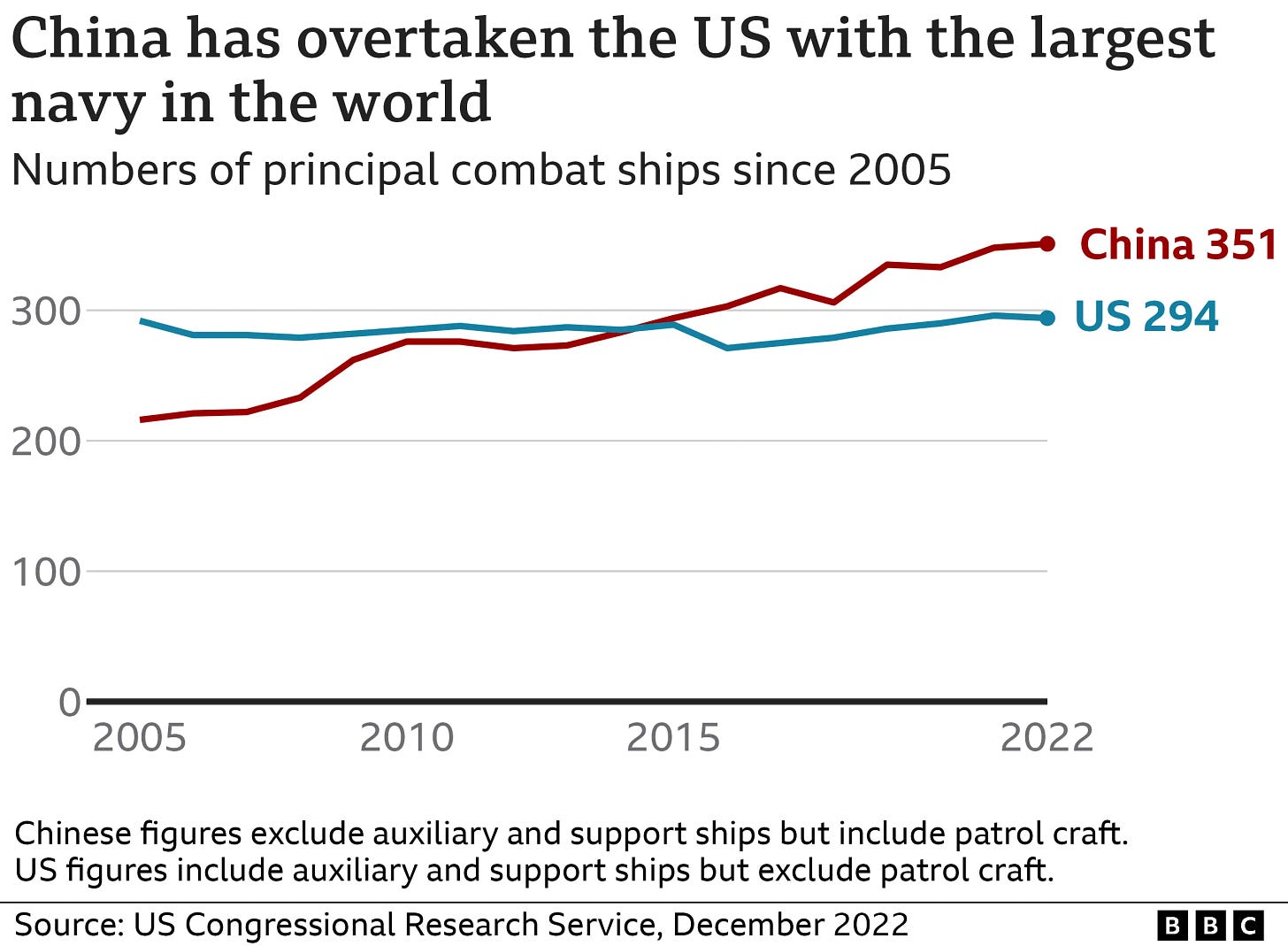China takes up an increasing amount of oxygen in the West’s internal political narrative.
The United States and its Asian allies have profound security concerns over a rising China. At the same time, the European Union and its member states struggle to strike a balance between the American-led post-war order and the economic ties many of these nations have established with China.
What makes this policy environment particularly difficult is the fluid nature of political relations and economic ties with China.
For example, German trade with China has been decreasing for the last two years (down 15.5% 2022-2023) as the German government ramps up rhetoric about the Chinese human rights record.
Meanwhile, German foreign direct investment in China continues to increase as EU companies, led by German businessmen, continue to bet on the Chinese market and its growing middle class.
Other White countries, such as Australia, must balance their economic relationship with China (China is Australia’s largest trading partner) and the immense threat that Chinese power and immigration pose to Australia’s national security and identity.
America and Britain too have issues with the immigration of Chinese people to their countries, especially Chinese students and professionals. Chinese students in the United States have been caught attempting to recruit individuals to spy on American companies and governments and Chinese students in Britain have stolen significant amounts of intellectual property that has ended up in the hands of Chinese firms.
It’s important to remember, though, that this debate and the policy environment that brought it about is the result of the neoliberal order that dominates in the West. Liberal policymakers in White countries lambast, provoke, and otherwise antagonise China while largely refusing to take domestic policy action to cut China off from the resources and capital of the West. Instead, Western policymakers leave the doors open to ever-widening Chinese predation upon Western resources.
American rhetoric in particular continues to grow increasingly militaristic even though Chinese nationals are being allowed to walk across the Southern border unimpeded. More than 55,000 Chinese have been encountered by US border authorities in the past 18 months which means, according to gotaway and undetected rates, more than 100,000 Chinese have entered the country in just those 18 months.
A self-confident and analytic Western nationalism is the only way to handle this situation appropriately.

China as a Foreign Threat:
Many Western politicians paint China as an existential whole-world threat bent on some form of forceful domination that will spread China’s model of authoritarian communism to every nation on Earth.
Christopher Wray, director of the American FBI, has called China a “whole-of-society threat” and implied, along with a 2018 Defense Strategy Paper released by the Department of Defense, that China seeks to reshape the world (including America) to its authoritarian model. Other Western thinkers, such as Graham Allison in Destined for War, have written that armed conflict between China and the United States is inevitable.
This rhetoric is dangerous and contrary to the national interest of the United States and other White countries.
Distinguished foreign relations scholar and Singaporean diplomat Kishore Mahbubani has authored several pieces wherein he contrasts US militarism in the past thirty years with Chinese military action. While China has sunken the occasional fishing boat, or engaged in fist fights with India it has not invaded neighbors and killed hundreds of thousands and perhaps millions of people as the United States has done in Iraq, Afghanistan, Yemen, Syria, and other countries.
The Chinese military is not a globe-spanning enterprise in the same way the American military is. The Chinese military does not even boast the same global presence as the French and the Chinese military remains overwhelmingly focused on its immediate geopolitical concerns.
China is certainly a military threat to the 14+ countries bordering it, and Chinese aggression in the South China Sea and against Taiwan does threaten to erupt into regional conflict, but these are regional conflicts in which White Western countries have little legitimate interest. Though the extent of this threat is likely greatly exaggerated.
China wants control over the South China Sea and has a naval base in Cambodia. China wants to keep global trade flowing and thus operates a naval base in Djibouti (alongside a half-dozen mostly Western nations). And China seeks to control its borders, so the nation operates a military outpost in Tajikistan. The only threat in the immediate neighborhood of a Western state is the Chinese listening and intelligence post in Cuba.
Still, China is not without seriously stated military objectives, and the most well-known example is that of Taiwan. Taiwan is also where the United States has decided to take an increasingly aggressive stand against China, despite Taiwan not being at all crucial to US national interests.
Protecting Taiwan (an island populated by ethnic Chinese) from Mainland China is a ridiculous preoccupation, for many reasons. The first is that continued American threats to engage in open conflict with China could themselves serve as the spark of a rapid escalation. Some serious scholars have already realised this, such as Christian Brose who writes in his book The Kill Chain that it is far from clear if the US and its allies could win such a conflict over Taiwan.
Several American scholars, including former National Security Advisor (and famous Warhawk) John Bolton and colleague Derik R. Zitelman, concluded that Taiwan is not of crucial national interest to the United States. Taiwan’s economic and geopolitical positions are not first-order priorities for the United States, though Bolton and Zitelman do assert that Taiwan’s status as a “vibrant, autonomous democracy” is critical and an American interest.
From a nationalist perspective, this is untrue. Taiwan’s form of government and the vibrancy thereof are not of significant concern to the West. Whether or not Taiwan has gay marriage and a liberal democratic form of government is of little real concern to the vast majority of Whites. In fact, only 38% of Americans support direct military intervention in Taiwan. Once again this proves that the public has better foreign policy instincts than the current elite.
Then there are the South China Sea and Australia, concerns which are intimately connected. If China were to assert full sovereignty over the islands in the South China Sea and gain uncontested control of the region it would give China the leeway to expand beyond the First Island Chain and begin to threaten the security and sovereignty of Australia and New Zealand.
This does not mean we believe China would invade Australia or New Zealand. Such an invasion would be incredibly logistically complex and likely require China to invade several other countries first, but this does not mean China wouldn’t take the opportunity to begin to assert itself in Australian and New Zealand waters, particularly in an attempt to control trade, fisheries, and the resources which these White countries have access to.
Chinese hackers have already stolen secrets from Australian intelligence, Chinese defectors have spoken at length about Chinese spy networks active on the ground in Australia, and there has been a surge in the level of corporate and intellectual property theft taking place by Chinese hackers and employees in Australia.
Still, instead of directly provoking China in the region the United States and White countries would be better served by following Stephen M. Walt’s strategy of offshore balancing. White countries should seek to strengthen the militaries of regional players such as the Philippines, Vietnam, Thailand, Indonesia, Malaysia, and Singapore so they can challenge Chinese assertiveness in the region.
This strategy has the benefit of not requiring a significant Western military presence and it will significantly lower tensions with China if American aircraft carriers and German warships are not sailing within sight of the Chinese mainland. It would help in containing China to its periphery, and allow for White countries to make domestic policy changes to deal with issues such as Chinese spying.
A nationalist approach to security and China is one where Western states do not needlessly assert themselves in the region and instead work to balance regional rivals and keep China tied up in its periphery.
China as a Domestic Threat:
We have already outlined in some detail how the Chinese spy, steal, undermine, and generally take advantage of Western liberal democracies and their adherence to the failed multicultural experiment and it is worth reiterating that China will continue to predate upon White countries until these weaknesses are dealt with.
The West must cut Chinese students out of its universities and other educational institutions. Chinese students have stolen incredible amounts of research and intellectual property, much of which is funded by Western tax dollars.
In one example from the mid-2010s a Chinese student in the US, who later enlisted in the US military, collected information on several high-level naturalised ethnic Chinese in the United States. This individual collected the information because he believed these fellow Chinese worked for science and technology companies contracting with the US Department of Defence and that they could be flipped to spy for China.
While this individual was arrested he is merely one of over 290,000 Chinese students in the United States and is likely to be one of many deeply loyal Chinese who are happy to collect information on American technology and personnel for the Chinese authorities.
More recently in 2023 two Asian members of the United States Navy were arrested for transmitting US military data to Chinese authorities. Persons of foreign extraction are allowed access to sensitive and secret national security information because the American elite refuses to acknowledge that race, ethnicity, background, and heritage play a significant role in human loyalties.
New Zealand is also facing similar issues due to its refusal to acknowledge that background plays a significant role in the loyalties of individuals. An ethnically Chinese citizen of New Zealand and an employee of the New Zealand government was arrested under suspicion of passing sensitive information onto Chinese diplomats in the country.
In another example, a Chinese member of the parliament of New Zealand, Jian Yang, was accused of spying for the Chinese state and forced to retire from parliament in 2021. Yang would later confirm he was still a member of the CCP though claimed he was “inactive” despite it being revealed he had taught English to CCP spies some years earlier.
The phenomenon is not limited to the English-speaking world, though. A Cambodian-born ethnically Chinese member of the French parliament caused serious controversy by voting against a bill condemning the alleged genocide of the Uyghurs by the Chinese state. This Chinese parliamentarian, who has since left France’s legislature, was later revealed to be a member of several organisations connected to the Chinese Communist Party. He had also hosted Chinese diplomats, invited them to speak before the French parliament, and took a trip to China where he met and shook hands with Xi Jinping.
But, it is the Western political elite who must accept the ultimate blame for this state of affairs. Most nations spy on others and collecting intelligence information has long been crucial to the survival and prosperity of states, but it is Western leaders who are making Chinese predation upon the West a seemingly simple task.
The Chinese are given near free rein to buy property, purchase companies, attend universities, and look for employment in the West. Descendents of recent immigrants are treated as if they are as Australian as a British pioneer from 1880 because the elite class refuses to concede that basic human nature entails a variety of loyalties, many of which are rooted in blood and ancestry.
Nationalist Solutions:
Nationalists understand the problems of political and corporate espionage, sabotage, intellectual property theft, and the undermining of Western national interest at the hands of the Chinese are primarily issues of identity. The Chinese both in China and as a diaspora see themselves as one cohesive nation with a clear inward loyalty, a loyalty which many Westerns wish that our politicians would display for our own countries.
In this light, there are sets of clear simple policies that Western countries should enact to prevent and fight against foreign security threats:
- Steadily phase out and eventually prevent non-Westerners from enlisting in schools and universities in the West.
- Ban the acquisition of property and businesses by non-Western persons and entities unless explicitly approved by a government watchdog.
a. A total ban on property or business sales to countries viewed as in geopolitical competition with the West
- Refuse to renew the visas of Chinese and Taiwanese nationals in the West and return them to their home countries.
- Denaturalise any Chinese or Taiwanese immigrant found to have committed a crime before their naturalisation.
a. Denaturalise any Chinese or Taiwanese immigrant who spies or is suspected of spying for their homeland after their naturalisation.b. Stop all further immigration and naturalisation of Chinese and Taiwanese in the future.
- Ensure that a robust program of repatriation is put into place to reestablish the healthy demographic majority of White peoples in their nations and political institutions.
These policies are a fantastic start to the necessary work of securing Western peoples against foreign interference. There is no need to cut off trade in wine or refined materials, nor do Western nations need to deliberately antagonise or attack China.
Our vulnerability to Chinese infiltration, espionage, and sabotage is the result of the poor policy choices made by the elite of the West, an elite that must be fundamentally reformed if the West is to survive as the dominant civilisation in the world.
This article originally appeared on White-Papers and is republished by The Noticer with permission. Follow the White Papers Policy Institute on Telegram here.


























